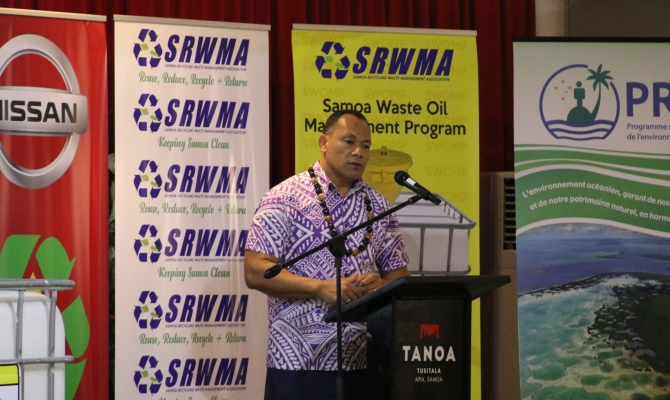
The Honorable Chair to the Fifteenth Noumea Convention COP,
Father Muliau Stowers,
Distinguished representatives of Parties,
Distinguished observers,
Ladies and gentlemen
I would like to thank the Chair for his opening remarks, and also thank all of the parties who have turned up in such promising numbers to this, the fifteenth conference of the Parties to the Noumea Convention conference of the Parties. We have a total of 9 to 10 of the Parties making it another great turnout. I think it again reflects the value we get from the convention in ensuring that - with often only shoestring budgets - activities of the Parties and the Secretariat together can be targeted and directed to tackle and resolve large environment management and pollution control challenges.
We all know about the increasing attention on our SPREP Region. But as an area larger than that of Russia, and as large as the surface of the Moon, we have very significant management challenges due to the immense marine ecosystem spread over 30,000 remote islands and communities that our the region supports. The challenge is further complicated when you couple the pressures or growth and development with so many varied manifestations of climate change.
It is therefore a critically important management challenge when you consider how we maintain the traditions, cultures and economies of Pacific Island Peoples that are reliant upon these vast yet vulnerable resources.
These challenges are recognized both regionally and globally through key documents such as:
- the S.A.M.O.A Pathway document, priority area “Ocean and Seas” (from the 3rd UN Conference on Small Islands Developing States held in Samoa);
- the Framework for a Pacific Oceanscape - endorsed by leaders in 2012, this is a call to act collaboratively and towards more integrated and holistic approaches to ocean and islands management;
- Voluntary Commitments made at the UN Oceans Conference;
- the Blue Pacific narrative endorsed by leaders in 2017 as the core driver of collective action for advancing the Leaders vision under the Framework for Pacific Regionalism;
- the 2050 Strategy for the Blue Pacific Continent endorsed by leaders in Tuvalu two weeks ago to ensure social, cultural, environmental and economic integrity, sovereignty and security in order to protect people, place and prospects of the Blue Pacific; and
- the spirit of these frameworks form the foundation for the SPREP Strategic Plan 2017-2026 – which is characterized by cross-disciplinary integration and a focus on oceans and climate change.
The Noumea Convention provides a legally binding document for Parties to undertake action for the environment in the Pacific islands region. The Noumea Convention was established in 1986 and entered into force in 1990. The Convention was established on the basis of a quite different set of regional issues to what we experience today. For example, the Convention don’t speak at all about climate change or plastic pollution specifically – undoubtedly two of the greatest challenges for us in this period.
Under the Convention, we have been able to address many of the emerging and challenging issues in this space, such as:
- Increasing marine pollution (including oil spill incidents, marine debris and plastic pollution) related to fishing, shipping and land-based sources;
- Deep Seabed Minerals exploration and mining;
- Increased fishing pressures on not only fish stocks but species of iconic cultural and biodiversity significance (eg the large threatened and migratory species);
- Ocean acidification (originating from global carbon emissions as local land run-off sources) and the silent declines in marine species survival and ecosystem resilience;
- Biodiversity and ecosystem health, integrated ocean governance, Biodiversity Beyond National Jurisdiction (BBNJ), … and
- Climate change including sea level rise, storms, ocean acidification and temperature rise, etc …..
The increasing demands and emerging pressures upon our regional natural resources - not just from within the region, but from multiple global scale drivers – call for even more effective resourcing and technical assistance, and co-operation, in order to better plan and manage for sustainable use of our Pacific Ocean and island resources.
The scope of the Noumea Convention text is limited when compared to the type and extent of environment issues facing the region today. This limits the effectiveness of the Noumea Convention in providing the international legal foundation for action on the environment issues of today.
The Convention Parties at this COP will deliberate on the review of the Conventions to evaluate its effectiveness to serve the region in addressing current as well as emerging issues. To look at whether the current scope of the Convention is adequate in providing the legal foundation for the broader issues of today and beyond. I hope the review is a catalyst for on-going future discussions as well.
Much more is needed on a range of issues, given the rapid increases in the scale of pressures and threats. For example, the Pacific oil spill response capabilities and contingency plan will be considered for endorsement at this COP. It is important to recognise the important role of international instruments play such as the Noumea Protocols and the International Maritime Organization (IMO) conventions, particularly the compensation and liability conventions in dealing with the pressures of oil spill incidents.
In managing all of these, we must also remember that we are dealing with closely interconnected ecological systems of oceans and islands to support diverse activities, economies, livelihoods and social wellbeing of people - both within the region and beyond. Over the next two days we will review a number of ongoing items and make decisions on at least 4 specific items under the Convention to take us forward in ocean environment management until the next Noumea Convention CoP in 2021.
In the next two days, as we review our work of the Convention to date, and plan our future efforts, I urge all of us to keep these key issues and objectives in mind.